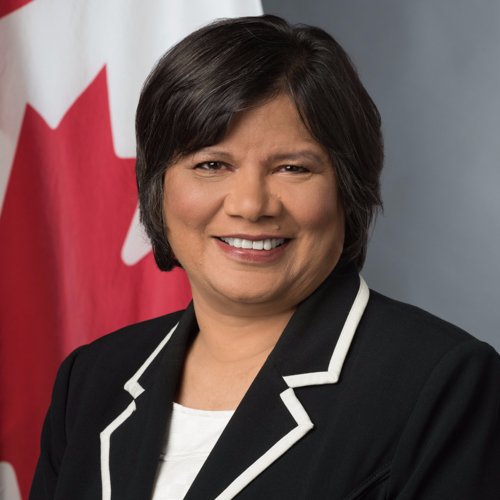Underlining the important role of the free press in protecting democracy and a rules-based international order, Canada’s High Commissioner to Guyana Lilian Chatterjee on Friday noted the challenging conditions facing journalists and pledged Ottawa’s solidarity with them.
“Increasingly, the media landscape is a very difficult terrain to navigate on its own, but it is even more dangerous when members of the media are attacked and muzzled in the execution of their duties. Many still soldier on regardless of the risk because they are committed and determined to uphold this important hallmark of democracy,” Chatterjee told a World Press Freedom Day event hosted at the residence of the British High Commissioner Greg Quinn at Bel Air Gardens, in Georgetown.
“Canada will always defend journalistic freedom and stand against any violence, intimidation, censorship, lawsuits threatening permanent injunctions of dissemination of factual information and false arrests used to silence journalists. From international broadcasters that bring the world into our homes, to local newspapers that empower us to shape the communities we live in – we know that a free press helps build stronger and healthier societies,” she added.
Though she cited no specific examples, Chatterjee’s remarks will be seen as a reference to a recent lawsuit against Stabroek News by the Minister of Public Telecommunications Catherine Hughes where she is extraordinarily seeking a “permanent injunction” against this newspaper and its columnist Anand Goolsarran from reporting on conflict of interest matters related to her company, Videomega Productions. Stabroek News has contended that concerns about conflict of interest are a legitimate area of inquiry and the newspaper’s Editor-in-Chief, Anand Persaud, has said that Hughes’ lawsuit will be fully contested. The reportage on the minister by the newspaper, he has said, constituted fair comment on a matter of public importance pertaining to a senior government official.
Chatterjee, a former journalist, told the event on Friday that the free press is a “mirror” that helps to build stronger and healthier societies. “If you don’t like what you see in the mirror, don’t shoot the messenger,” she said.
She also pointed out that promoting media freedom is a key component of Canada’s advocacy to strengthen the rules based international order, democratic resilience and respect for the right to freedom of opinion and expression.
Chatterjee also noted that her country is concerned that widespread use of digital technologies has “enabled the proliferation of disinformation, making the public more vulnerable to manipulation.” In this regard, she said that efforts to advance media freedom must seek to protect both the media’s right to speak and the public’s need to access information of public interest and value in order to exercise their democratic rights.
For his part, Quinn also observed that a free media environment is an essential ingredient to a well-functioning democracy and the rules based international system. “Without it there is no accountability,” he said.
He noted that there is evidence to show that the media in Guyana “are generally free” and he made reference to the 2019 Reporters Without Borders World Press Freedom Index, which ranks Guyana 51 out of 180 countries assessed, which represents an improvement of four places from 2018.
Quinn made it clear that the UK is committed to the promotion of media freedom and the protection of journalists. “Freedom of the media, and the freedom of expression more broadly, is an essential quality of any functioning democracy. People must be allowed to discuss and debate issues freely, to challenge their governments and to make informed decisions, all informed by a strong and robust media,” he stressed.
Quinn also highlighted the role journalists have to play in elections while noting that they must be able to provide voters with reliable, impartial and accurate information that will help them to make their own decisions.
United Nations Resident Representative Mikiko Tanaka stressed that ethical and responsible journalism during an election campaign reduces tensions, informs the electorate and creates a space in which ideas can be exchanged and compromises can be reached.
Tanaka said that as the fight against censorship, media closure and violence against journalists continue, “we also need to be better equipped against new phenomenon, such as fake news and misleading media outfits which distort the reality and inflame tensions.”
“Journalism needs to be based on facts and ethics and journalists need to understand the important role they play in helping to perceive the reality around them… Elections need to be a competition of ideas and proposals, not of lies and distortions. The high stakes of elections need the collective power of the press to keep the debate on topic and issues in a manner that will help to make the citizens make up their minds,” she noted.
Tanaka added that free, independent and professional journalism, both online and offline, serves an essential role in democracies and can also contribute to free and fair elections and the elections agenda by requiring politicians to respond to the public and focus on subjects that are of public interest. This, she noted, can also bridge divides and prevent polarisation and violence.









